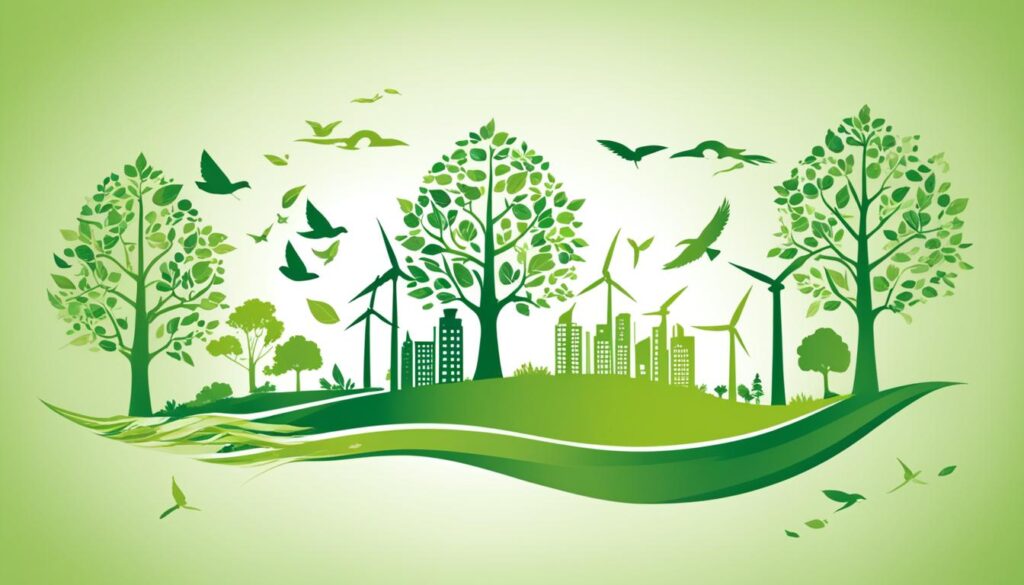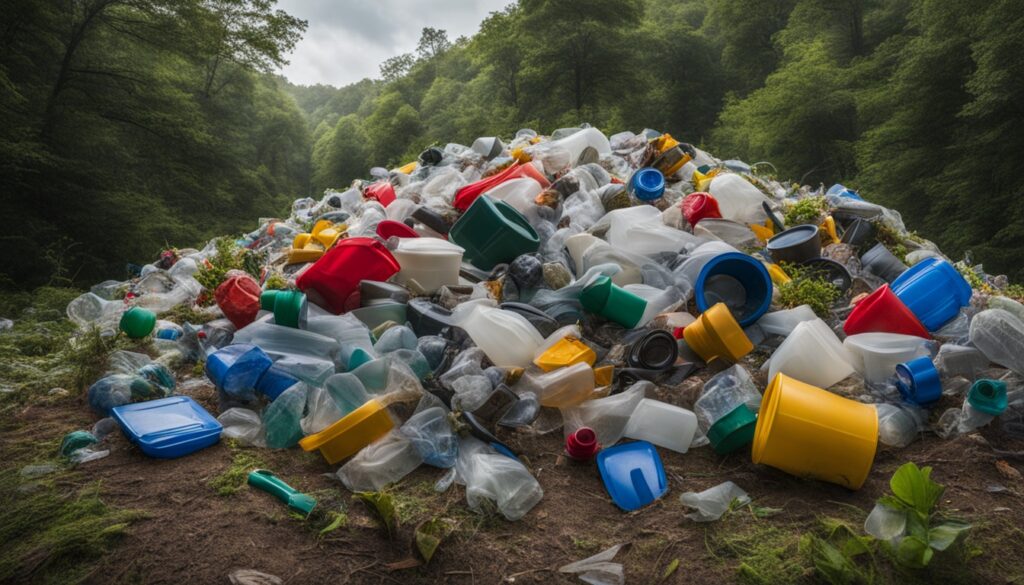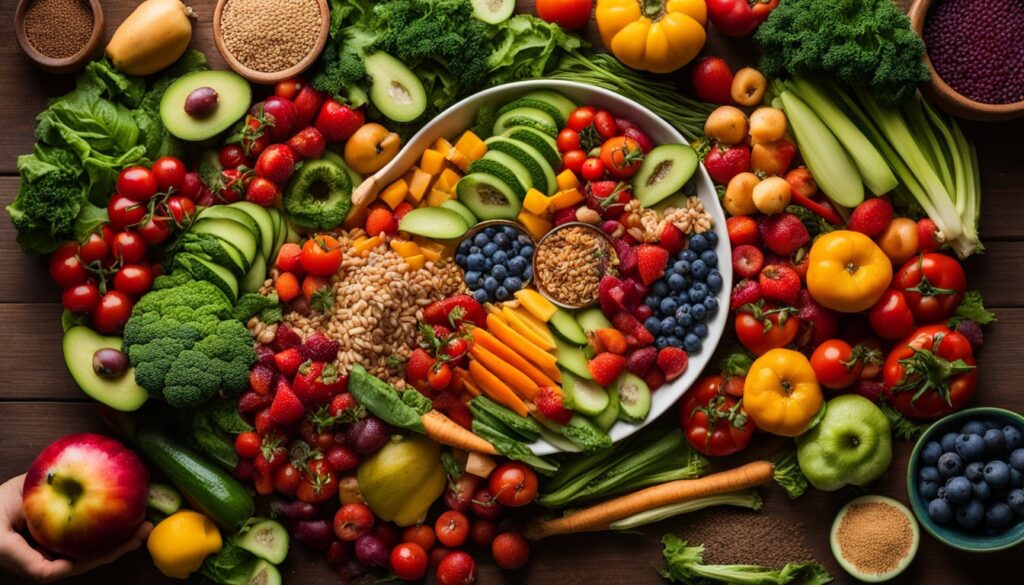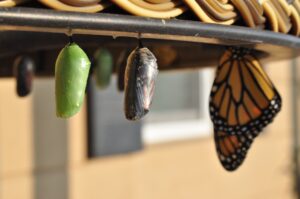“The future of our planet is in our hands. We need to start living more eco-consciously. Sir David Attenborough urges us to make a greener, sustainable world for future generations.” – Renowned British broadcaster and natural historian, Sir David Attenborough.
Living an eco-conscious way means we lessen our environmental footprint. This article is full of tips to help you live sustainably. It covers how to cut down on waste and save energy. You’ll also learn to make smarter choices every day. Together, these changes can lead to a better, more eco-friendly future.
Key Takeaways
- Understand the importance of reducing your environmental impact through eco-conscious practices.
- Discover practical strategies to adopt a more sustainable lifestyle, from waste reduction to energy conservation.
- Learn how your individual actions can contribute to a greener future for our planet.
- Explore the benefits of embracing ethical consumerism and supporting eco-friendly products and services.
- Gain insights into the significance of renewable energy and zero waste living for a more sustainable tomorrow.
Embracing an Eco-Friendly Mindset
Getting eco-friendly starts with knowing our carbon footprint. What we eat, what we buy, and how far we go all bump up greenhouse gas emissions. This, in turn, affects climate change. Although your single effort might feel tiny, imagine everyone’s impact.
Understanding Your Carbon Footprint
Your carbon footprint is how much you personally add to greenhouse gas emissions. This happens through daily life choices. Knowing this can help us spot where we can cut back, helping the planet.
The Significance of Individual Actions
Switching to a greener life can actually make a big difference. If we try to use less and live sustainably, it helps a lot. We all have a part to play in making our future more eco-friendly.
Reducing Plastic Waste
Want to live more sustainably? Start by using less plastic. Things like water bottles, shopping bags, and forks you use once harm our planet a lot. Instead, use things over and over. Like a steel water bottle, a strong tote bag, and eco-friendly cutlery. This stops so much plastic from polluting our Earth every year.
Avoiding Single-Use Plastics
To cut down on plastic, avoid using things just once. Items for quick use build up and hurt our world. Just by always having your own water bottle and bag, you lessen daily plastic waste by a lot.
Embracing Reusable Alternatives
Using stuff that you can use again is key to fighting plastic waste. There’s many items, from straws you can clean to containers for your food. You may pay more at first, but the Earth and your pocket will thank you later.
Responsible Recycling Practices
Though less and reusing are best, knowing how to recycle right also helps. Make sure to follow local rules for a better recycling process. This lets us keep materials in use and out of nature’s homes, like the landfill.
Minimising Food Waste
Food waste is a big problem for our planet. In the US, about 40% of food ends up in the trash. This not only wastes resources but also adds to the gases that heat our earth. It’s a shame because this food could have gone to those who need it. To tackle this, we should shop more carefully and look into composting.
Mindful Shopping Habits
Buying only what we need is a great start to cut food waste. It stops us from buying too much and letting it spoil. This way, we help the planet, keep our shopping eco-friendly, and save money.
Composting Solutions
Composting turns food scraps into good soil. This means less food waste ends up in dumps. Dumps give off lots of bad gases. Besides, the soil from composting is great for growing more food. It makes a cycle that’s good for nature and our gardens.
| Benefits of Composting | Challenges of Food Waste |
|---|---|
|
|
“By adopting more mindful shopping habits and embracing composting solutions, we can significantly reduce our food waste and contribute to a more sustainable future.”
Eco-Conscious Living: Embracing a Plant-Based Diet
Choosing to eat more plants or less meat is great for the planet. The meat industry adds a lot to our greenhouse gas problem. Cows and sheep, for example, release much methane. Eating more plants or cutting down on meat helps the environment a lot.
Environmental Impact of Meat Production
Meat, especially beef and lamb, uses a lot of our resources. It needs vast lands and huge amounts of water. It also creates a lot of methane. Eating less meat can hugely reduce how much we harm the planet.
Sourcing Local and Organic Produce
Buying food that’s local and organic is good too. Locally grown food doesn’t travel far so it reduces pollution. Organic farms are also kinder to the earth. They don’t use harmful chemicals. This helps keep the soil healthy and lowers pollution even more.
Growing Your Own Food
If you can, growing your own vegetables is a plus. It’s good for the planet and you. You can make sure your food is safe and has no bad chemicals. Plus, it cuts down on transport pollution. You don’t need a big garden. Even a pot on your balcony can help.
| Metric | Meat Production | Plant-Based Diet |
|---|---|---|
| Land Use | 26 kg CO2e per 100g of protein | 0.3 kg CO2e per 100g of protein |
| Greenhouse Gas Emissions | 12 kg CO2e per 100g of protein | 0.4 kg CO2e per 100g of protein |
| Water Use | 1,800 litres per 100g of protein | 250 litres per 100g of protein |
By going for more plant-based foods, eating local and organic, and growing our own, we do a lot of good. We lower how much we hurt our planet. And we move towards a future where living well goes hand in hand with being eco-friendly.
Energy Conservation at Home
Reducing how much energy we use at home is really important for the planet. We can do this by using different strategies. Not only does it save us money, but it also helps the earth by making our carbon footprint smaller.
Conducting a Home Energy Audit
The first step to making our home use energy better is an energy audit. This means looking for places where we waste energy. It could be through gaps under doors, places without enough insulation, or old appliances that use too much energy. Fixing these issues helps us save energy and be more sustainable.
Upgrading to Energy-Efficient Appliances
Getting new, energy-efficient appliances is a great way to use less energy at home. Things like fridges, washers, and air conditioners use a lot of power. Replace them with Energy Star appliances to use less energy. This saves money on electricity over time.
Exploring Renewable Energy Sources
To be even more eco-friendly, look into renewable energy like solar panels. With solar panels, we can make our own clean energy. This means we use less fossil fuel and cut down our carbon footprint. While it costs more at first, the savings and good for the environment are worth it for those who care about the earth.
Water Conservation Practices
Water is a precious resource, with only 1% suitable for drinking. We can make a big difference by adopting water conservation practices. Little actions like turning off the tap when not in use, short showers, and using a watering can help. These steps lower our water usage.
Reducing Water Usage
Being mindful about how much water we use daily can make a big difference. Actions like turning off the tap while brushing, taking quick showers, and using a watering can can cut down water consumption. These changes matter. They help in water conservation and keep this vital resource for the future.
Rainwater Harvesting Techniques
Using rainwater harvesting techniques can give us another water source. Setting up rain barrels lets us collect water for other tasks. This water can be used for gardening, car washing, and more. It lessens our need for treated water and supports sustainability.
Combining water conservation methods is very effective. It helps in saving our natural resource. Every bit of water saved is crucial for the sustainability of our planet.
Sustainable Transportation Choices
Our travel choices affect how much we harm the environment. Choosing ways to travel that are kinder to the planet can help reduce our carbon footprint. There are several green options worth looking into.
Carpooling and Public Transportation
Sharing rides with others, known as carpooling, is a great step. It helps cut the number of cars on the road. This lowers our personal carbon output. Carpooling not only saves on fuel but also connects us with our community and saves us money. Public transport also plays a significant role. Buses, trains, and the metro produce less emissions per person than private cars do.
Offsetting Carbon Emissions
Some trips, especially long-distance or flights, might not have green options. For these, we can offset our emissions. This means investing in carbon credit schemes. These support various projects, like planting trees or creating renewable energy. Offsetting unavoidable emissions is our way of lessening harm and supporting a sustainable future.
Eco-Friendly Products and Services
We can do more than just change our daily habits. Supporting green businesses helps a lot. Using eco-friendly products, like cleaning and beauty products with natural ingredients, makes a difference. It cuts down on the harm to our planet. Buying from companies that care about sustainable business practices and ethical consumerism pushes others to do better too.
Sustainable Cleaning and Beauty Products
Looking out for sustainable cleaning products and eco-friendly beauty products is key. It’s all about choosing items that are made with natural ingredients. Such things are friendly to our planet and lead to a more eco-conscious lifestyle.
Supporting Ethical Businesses
Our choices in what we buy matter a lot. Supporting businesses that care about sustainable business practices does good for the earth. These companies do a lot to lower their impact. They use clean energy and find ways to make less waste. Our support for these eco-friendly products and services nudges more businesses to be responsible.
Conclusion
It’s vital that we all live in a way that’s good for the planet. Simple steps like using less plastic, throwing away less food, saving energy and water, and picking eco-friendly cars and items really add up. Each of us can do a lot to help the environment.
We should keep getting better at these earth-friendly habits. Even small things matter a lot. We’re all part of shaping a future that’s kinder to our world. Together, our efforts can truly change things for the better.
Choosing to live in a green way is key to a better future. We must protect the planet and its resources. Our goal is a healthier Earth for those who will come after us. Let’s stay committed to this important life change for the environment.






